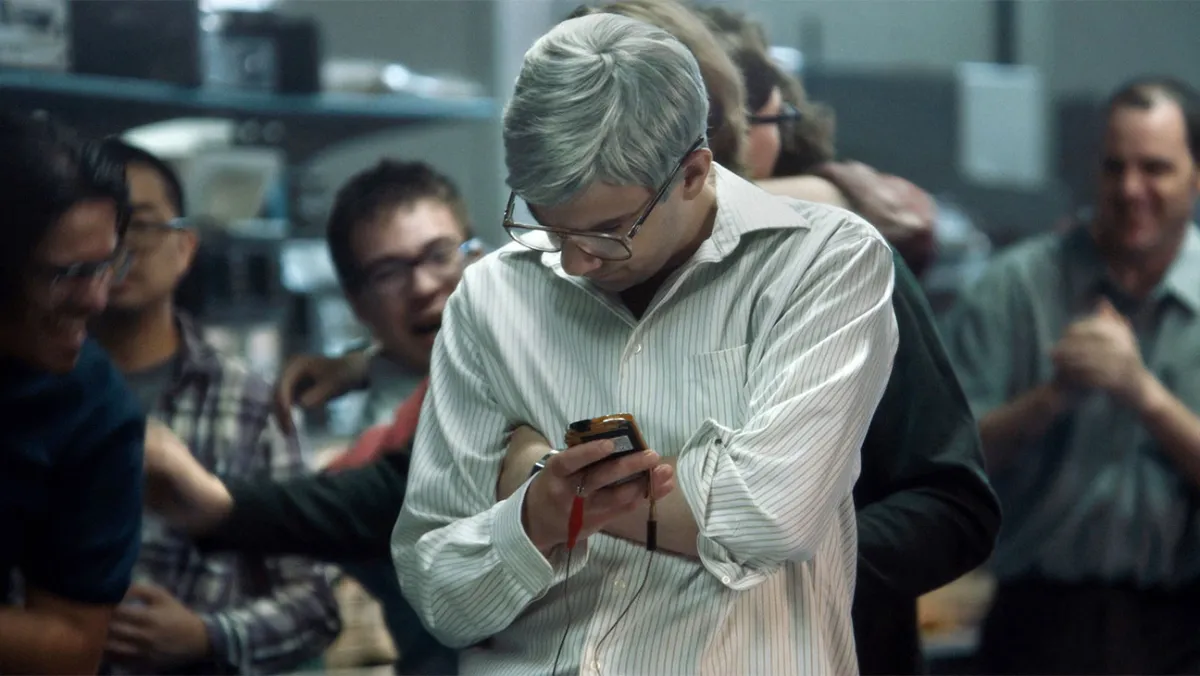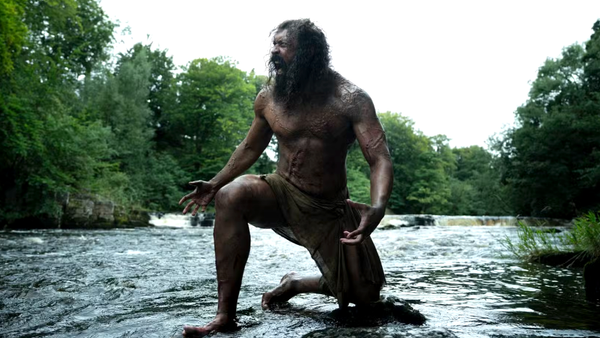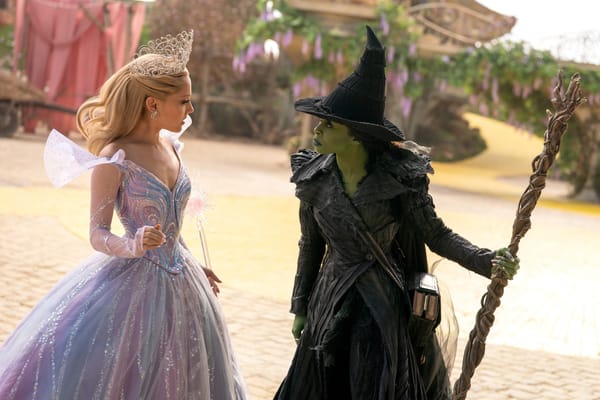The 'Blackberry' Movie Is About the Innovator's Dilemma
Plus: CNN's Terrible, Horrible, No Good, Very Bad Town Hall.

Stories about the rise (and occasional fall) of businesses are a hot entertainment commodity these days. Over the past few years, business-centric stories like WeCrashed, The Dropout, Tetris, and Air have given us a glimpse at the processes and people that made companies successful. At their worst, these films are little more than an artless opportunity for talented actors to play dress-up, donning outdated clothes and new accents to dramatize a company’s Wikipedia entry. At their best, they have something to say about the role that technology plays in our lives and our culture, and possibly even comment on the human condition.
I’m happy to say that Matthew Johnson’s Blackberry movie is the latter. Chronicling the rise and fall of Research In Motion (RIM), makers of the Blackberry, Blackberry follows the unlikely pair of Mike Laziridis (Jay Baruchel) and Jim Balsille (Glenn Howerton) as they built and sold one of the most beloved, iconic email-capable mobile devices ever made. I can’t speak to how accurately Baruchel and Howerton actually capture their real-life counterparts; from footage I’ve seen of both Laziridis and Balsille, the actors don’t really resemble them physically nor demeanor-wise. But as an on-screen pair, they are wonderful to watch. Baruchel brings technical know-how but is constantly struggling to assert his will in the presence of Howerton’s bombast. For his part, Howerton himself chews up the scenery expertly as a classic MBA-graduate asshole who’s okay with cutting ethical corners to drive growth.
At one point, RIM controlled around 50% of the smartphone market in the U.S. and 20% worldwide. Today, they are no longer a player at all in a world that’s dominated by iPhone and Android. It’s a staggering rise and fall for a company that was riding high a mere 20 years ago. One of the things that the film does a great job of capturing is how disorienting this journey can feel for its protagonists. As a great engineer, someone like Laziridis has had to depend on his own instincts for his entire career. After all, they are the same instincts that brought him unfathomable success. But what does one do when those instincts no longer match what the market is looking for? Where does that leave someone who was once considered a genius in his field?
The story of RIM feels like a classic case of the Innovator’s Dilemma, a concept pioneered by business professor Clayton Christensen. In his 1997 book of the same name, Christensen explains how successful, entrenched firms are uniquely unprepared for disruptive technologies:
The reason [companies fail] is that good management itself was the root cause. Managers played the game the way it’s supposed to be played. The very decision-making and resource allocation processes that are key to the success of established companies are the very processes that reject disruptive technologies: listening to customers; tracking competitors actions carefully; and investing resources to design and build higher-performance, higher-quality products that will yield greater profit. These are the reasons why great firms stumbled or failed when confronted with disruptive technology change.
The iPhone was one of the most disruptive products in human history and RIM was totally unprepared. For awhile after the iPhone was introduced, Blackberry kept leaning into its strengths, iterating slowly on the Blackberry classic design and hoping to bring new customers into the fold. When it finally tried to chase after that iPhone market share, the result was one of the most disastrous tech launches in history. They just couldn’t compete.
What I also liked about Blackberry is that it doesn’t make its characters into saints. So much of the narrative that we’ve been fed about technology over the past few decades is about how it’s a democratizing force that will re-shape society for the better. But companies like RIM often don’t succeed by playing by the rules. Howerton’s Balsille embodies this concept as he steamrolls his underlings and engages in all manner of unsavory activities in the pursuit of profit.
Blackberry does fall into same traps as other movies of its ilk. A handful of scenes are a bit too on the nose (e.g. the movie’s version of how the Blackberry got its name) and I found some of the haristyles a bit too ridiculous for me to take seriously. But at its core, it’s a Shakespearean story of arrogance, betrayal, and how the biggest danger is often not the one you can see coming. I loved it.
Things Are About To Get A Lot Worse, Again
CNN’s held a Town Hall with Donald Trump this past week and the results were sad and predictable. called it "disastrous." called it a "fascist ritual." The event allowed Trump to broadcast his lies to millions of people, not to mention an extremely sympathetic Republican crowd, in a live TV environment. While moderator Kaitlan Collins did a decent job trying to fact-check Trump and correct the record, one can only do so much when one has been set up to fail.
People elsewhere have discussed this much more in depth but I wanted to mention two things that stuck out to me.
The first is CNN’s response after the fact. Chief executive Chris Licht has been under fire from his news organization for hosting this sad spectacle and his response has been to double down. Here’s Brian Stelter reporting on a CNN editorial call the morning after the Town Hall:
Chris Licht begins CNN's 9am editorial call by praising [Kaitlan Collins] for a "masterful performance last night." He says "I couldn't be more proud of her" and the whole team in NH. Then he says he's aware of the backlash.
"You do not have to like the former president's answers, but you can't say that we didn't get them," Licht tells staffers, many of whom are angry about the town hall. "Kaitlan pressed him again and again and made news. Made a LOT of news." And "that is our job."
Is it though? (Anderson Cooper certainly agrees). It might be if your job is to create entertainment; less so if your objective is to provide people useful information about a presidential candidate. Did we learn anything about Trump that we didn’t already? Were his policy positions illuminated with more nuance? Who was served by this event, other than the Trump Campaign?
To the extent the media made mistakes in the lead-up to the 2016 election, it was in thinking of Trump like he was a regular political candidate. But for all his faults, Trump is a canny media manipulator. He cannot be treated as someone who is operating in good faith, nor can you simply employ the View from Nowhere in your coverage and expect a positive result. The CNN Town Hall showed that the media mistakes we saw in the lead-up to Trump’s victory last time are probably about to repeat themselves.
The second thing I wanted to point out is that laughter. You probably know what I’m talking about: at one point, when asked about the fact that a federal jury ruled Trump had sexually abused and defamed E. Jean Carroll, Trump denied the claims and mocked Carroll. The audience laughed:
It was a stark reminder that regardless of how awful Trump is, he’s still the Republican frontrunner and he still has an audience of millions willing to indulge him. When it comes to things like the E. Jean Caroll verdict or the January 6th insurrection, there are tons of folks out there that either don’t think Trump did anything wrong, or think he should be able to lie, abuse, and defame with impunity. A huge portion of the American electorate is willing to welcome Trump back to the White House and will cheer on all the outrageous, upsetting behavior that will propel him there. To quote political analyst Jared Yates Sexton:
Listen, if this town hall is any indication, and I think it is, the Trump Campaign of 2024 is going to be infinitely more disturbing and upsetting. I've spent a lot of time studying this man and his movement. I'm stunned by the depths here. This is...awful.
Other Stuff David Chen Has Made
- On This Week In Streaming, Siddhant Adlakha and I wrapped up our conversation about Dead Ringers season 1. I loved this show!
- On Decoding TV’s YouTube channel, Kim Renfro and I discussed Tom and Shiv’s big confrontation scene on last week’s Succession.
- On The Filmcast, we posted a bonus excerpt of our After Dark episode discussing Polite Society, a movie I really wanted to love but only ended up kinda liking.
- [PAID ONLY] On Decoding TV’s bonus feed, David Cho and I discussed whether or not rich people have bad taste.
- [PAID ONLY] On my personal Patreon page, @joyonapping and I discussed life as a Seattle film nerd these days.



